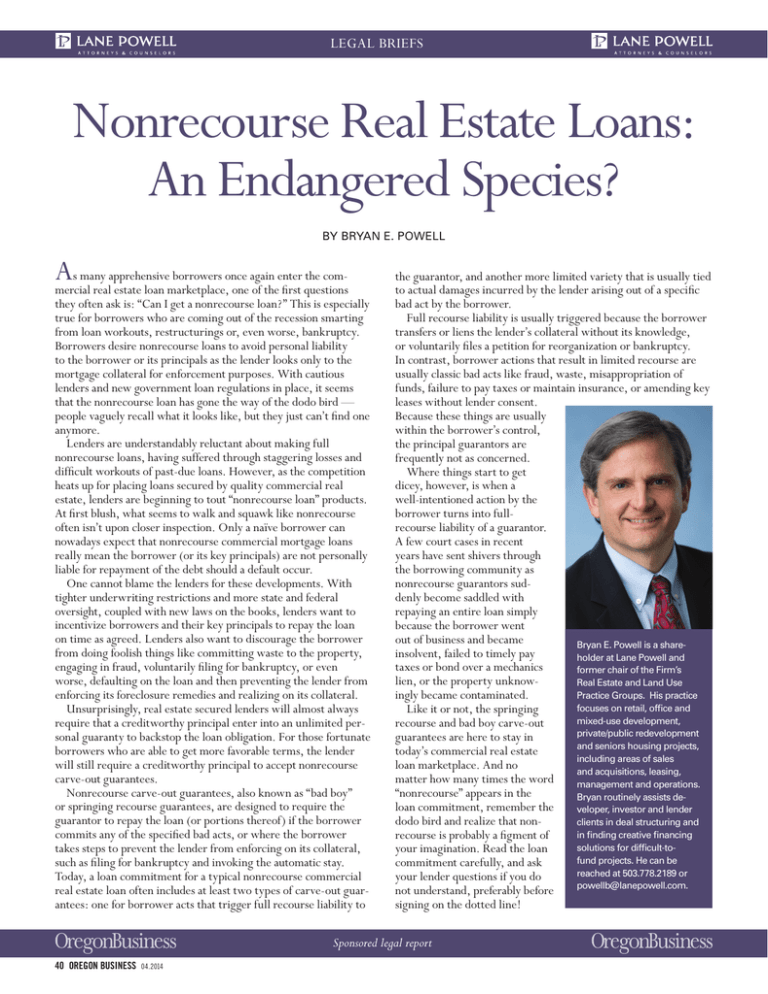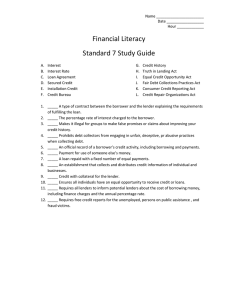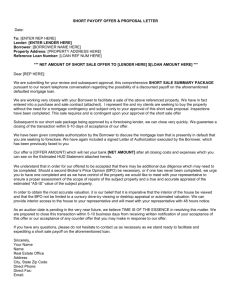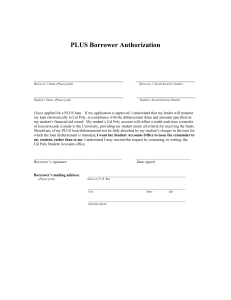a LegaL Briefs
advertisement

Legal Briefs Nonrecourse Real Estate Loans: An Endangered Species? by Bryan E. Powell A s many apprehensive borrowers once again enter the commercial real estate loan marketplace, one of the first questions they often ask is: “Can I get a nonrecourse loan?” This is especially true for borrowers who are coming out of the recession smarting from loan workouts, restructurings or, even worse, bankruptcy. Borrowers desire nonrecourse loans to avoid personal liability to the borrower or its principals as the lender looks only to the mortgage collateral for enforcement purposes. With cautious lenders and new government loan regulations in place, it seems that the nonrecourse loan has gone the way of the dodo bird — people vaguely recall what it looks like, but they just can’t find one anymore. Lenders are understandably reluctant about making full nonrecourse loans, having suffered through staggering losses and difficult workouts of past-due loans. However, as the competition heats up for placing loans secured by quality commercial real estate, lenders are beginning to tout “nonrecourse loan” products. At first blush, what seems to walk and squawk like nonrecourse often isn’t upon closer inspection. Only a naïve borrower can nowadays expect that nonrecourse commercial mortgage loans really mean the borrower (or its key principals) are not personally liable for repayment of the debt should a default occur. One cannot blame the lenders for these developments. With tighter underwriting restrictions and more state and federal oversight, coupled with new laws on the books, lenders want to incentivize borrowers and their key principals to repay the loan on time as agreed. Lenders also want to discourage the borrower from doing foolish things like committing waste to the property, engaging in fraud, voluntarily filing for bankruptcy, or even worse, defaulting on the loan and then preventing the lender from enforcing its foreclosure remedies and realizing on its collateral. Unsurprisingly, real estate secured lenders will almost always require that a creditworthy principal enter into an unlimited personal guaranty to backstop the loan obligation. For those fortunate borrowers who are able to get more favorable terms, the lender will still require a creditworthy principal to accept nonrecourse carve-out guarantees. Nonrecourse carve-out guarantees, also known as “bad boy” or springing recourse guarantees, are designed to require the guarantor to repay the loan (or portions thereof) if the borrower commits any of the specified bad acts, or where the borrower takes steps to prevent the lender from enforcing on its collateral, such as filing for bankruptcy and invoking the automatic stay. Today, a loan commitment for a typical nonrecourse commercial real estate loan often includes at least two types of carve-out guarantees: one for borrower acts that trigger full recourse liability to the guarantor, and another more limited variety that is usually tied to actual damages incurred by the lender arising out of a specific bad act by the borrower. Full recourse liability is usually triggered because the borrower transfers or liens the lender’s collateral without its knowledge, or voluntarily files a petition for reorganization or bankruptcy. In contrast, borrower actions that result in limited recourse are usually classic bad acts like fraud, waste, misappropriation of funds, failure to pay taxes or maintain insurance, or amending key leases without lender consent. Because these things are usually within the borrower’s control, the principal guarantors are frequently not as concerned. Where things start to get dicey, however, is when a well-intentioned action by the borrower turns into fullrecourse liability of a guarantor. A few court cases in recent years have sent shivers through the borrowing community as nonrecourse guarantors suddenly become saddled with repaying an entire loan simply because the borrower went out of business and became Bryan E. Powell is a shareinsolvent, failed to timely pay holder at Lane Powell and taxes or bond over a mechanics former chair of the Firm’s lien, or the property unknowReal Estate and Land Use Practice Groups. His practice ingly became contaminated. focuses on retail, office and Like it or not, the springing mixed-use development, recourse and bad boy carve-out private/public redevelopment guarantees are here to stay in and seniors housing projects, today’s commercial real estate including areas of sales loan marketplace. And no and acquisitions, leasing, matter how many times the word management and operations. “nonrecourse” appears in the Bryan routinely assists deloan commitment, remember the veloper, investor and lender dodo bird and realize that nonclients in deal structuring and in finding creative financing recourse is probably a figment of solutions for difficult-toyour imagination. Read the loan fund projects. He can be commitment carefully, and ask reached at 503.778.2189 or your lender questions if you do powellb@lanepowell.com. not understand, preferably before signing on the dotted line! Sponsored legal report 40 Oregon Business 04.2014




